
The new Holy Angels Mausoleum & Columbaria building is at the heart of Gardens of Gethsemani and anchors our Holy Sacred grounds.
Holy Angels Mausolea & Columbaria includes the addition of full body crypts, granite niches, and glass-fronted niches, providing a bright and reverent space for remembering.
Features
Village Concept
Holy Angels was designed to be a small village, complete with trees, water features, low walls, and statues that pay homage to the holy angels. This beautiful new area was named Holy Angels because they are our friends, protectors, and messengers. They look out for us in life and in death.
Continuing Your Legacy
This is a place of remembrance created for your family to gather in prayer and continue the legacy of loved ones.
Part of our Christian Family
When you choose Holy Angels, you become part of our Christian community. Our brightly lit Mausolea and Columbaria are very cozy for visits and prayer. Our grounds are open 365 days a year from 8:00 am until dusk so those you care about can always be close.
Protected by the Angels
Entrusted to God’s Angels, these sacred tombs are surrounded by beautiful statues and inspiration from scripture that remind us of our heavenly eternity.
You Make the Decisions
New locations mean now is the perfect time to get first pick on exactly where and how you want to be remembered.
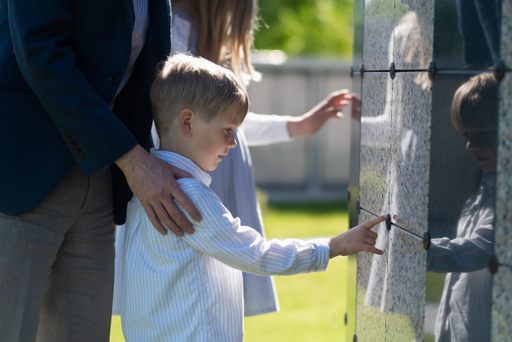
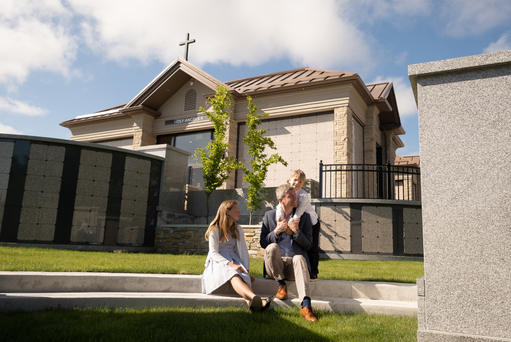

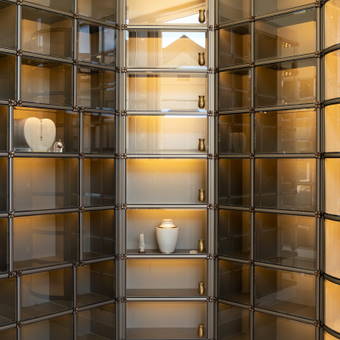
GLASS FRONT NICHE
Interior niches allow for an intimate connection to visitors who can see photographs and meaningful belongings.
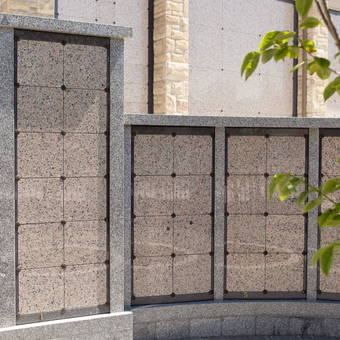
GRANITE FRONT NICHE
Outdoor granite front niches available for singles and doubles.
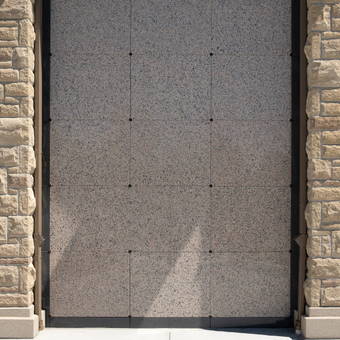
MAUSOLEUM
Outdoor full-body tombs made from granite. Available for singles and doubles.
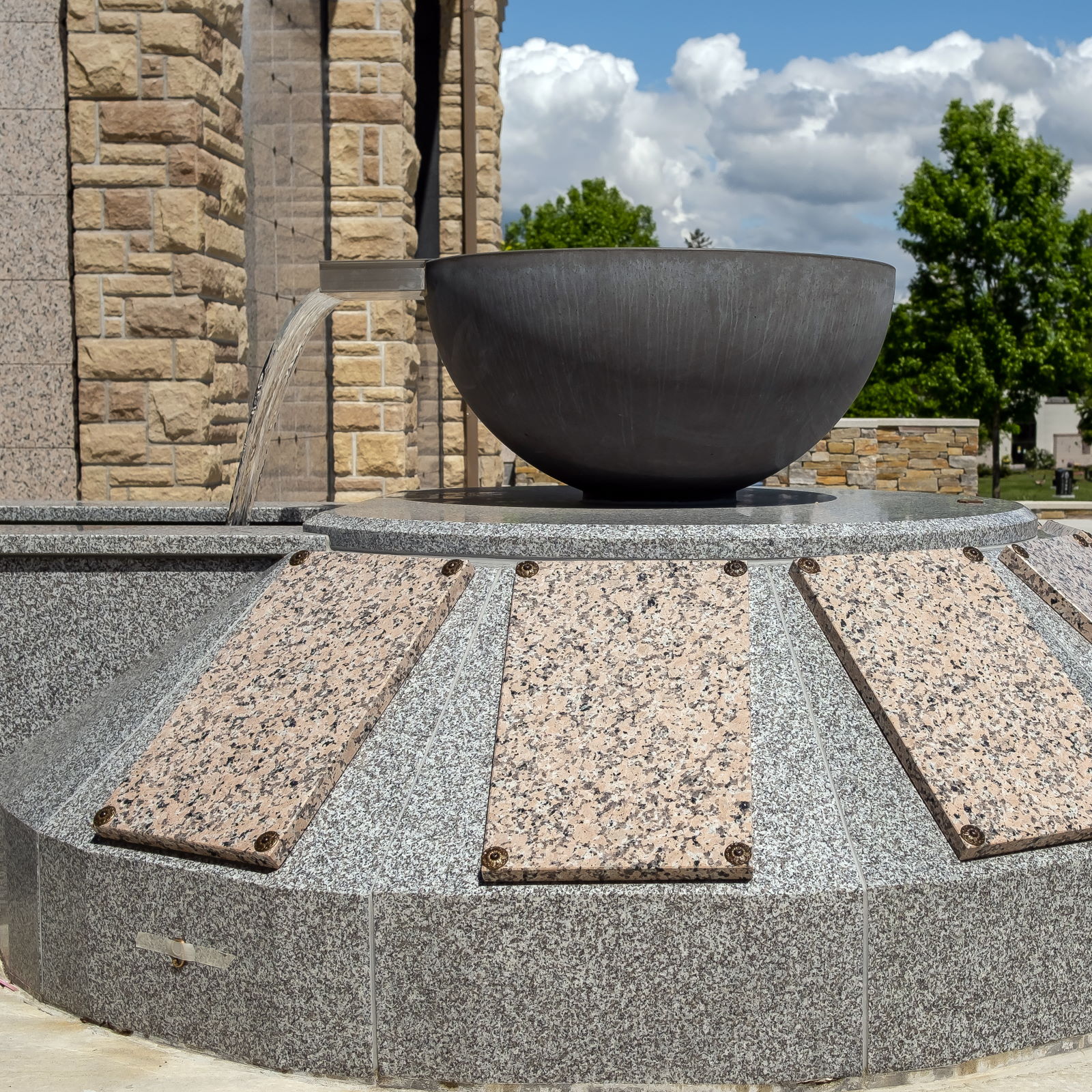
WATER FEATURE NICHES
Outdoor double angled wall granite niches by the water feature.
“Gardens of Gethsemani is beautifully maintained and very peaceful. The new Holy Angels Columbaria is well-sited in the lush green and rolling grounds. I feel very blessed that this will be my final resting place.”
“It’s big, it’s beautiful, and it may be the first of its kind in Metro Vancouver. The Holy Angels Mausolea and Columbaria… looks more like a small village than a cemetery.”
“We wanted it to have a community feel, we wanted it to fit with our direction to provide sacred space for prayer and worship, and we wanted it to be a unique Christian environment.”
“With the presence of the Holy Angels, it is a fitting, indeed a beautiful, prayerful place in which to remember the faithful departed whom, we hope, are rejoicing in God’s presence.”
Location
Holy Angels Mausolea and Columbaria is located in the heart of our cemetery which extends to 58 acres, surrounded by trees and new green space.
Gardens of Gethsemani Cemetery
15694 32nd Avenue
Surrey, B.C. V3Z 9V1, Canada
E-mail: info@rccav.org
Visitation and Office Hours
Office Hours: Monday – Saturday, 9 a.m. – 4:30 p.m.
Phone: (604) 531-2141
Fax: (604) 536-8828
Cemetery visiting hours:
Dawn until dusk, 365 days a year
AS ONCE YOU SENT YOUR HOLY ANGEL TO MINISTER TO YOUR SON IN THE GARDEN OF GETHSEMANI, SO MAY YOUR ANGELS REMAIN HERE ALWAYS TO BRING COMFORT TO ALL WHO MOURN.
Responses for this FAQ have been prepared from the Catechism of the Catholic Church and the recently published book His Angels at Our Side, Understanding Their Power in Our Souls and the World[1] by Father John Horgan. Father Horgan is a priest in Archdiocese of Vancouver and pastor of St. Pius X Parish in North Vancouver. He is a graduate of Harvard University and the Angelicum in Rome. He is author of the book His Angels at Our Side: Understanding Their Power in Our Souls and the World. Father is a member of the Catholic Cemeteries Advisory Board guiding the ministry in its care to the community.
Who are the Holy Angels?
The angels are mighty spirits sent by God to bring us His message of life, grace and peace. They guide us on the path to holiness. As servants of Christ in the mystery of the Church, angels enlighten us, guide us, watch over us, defend us and lead us on the path of eternal life[2]. Many “non-religious” people believe in angels and look to angels as spiritual guides and friends.
Why is the new area of the Gardens of Gethsemani named after the Holy Angels?
The angels watch over our cemeteries and the bodies of our loved ones because they are sacred and will share in the Resurrection. From early in its history, the Catholic Church has believed that angels watch over and protect our cemeteries because the bodies of our loved ones are sacred. Our bodies will share in the happiness of Heaven…the Resurrection. It is an honour to name the new area after the angels who we recognize as our helpers and messengers of God’s love. It is in the original Gardens of Gethsemani, an angel accompanied our Lord during his Passion at a time of great sorrow and provided him with comfort: “…there appeared an angel from heaven, strengthening him.” (Luke 22:43).
Can we interact with angels?
Yes. We can call on angels for help and ask them to interceed with God. The Catholic Church believes that all men and women regardless of their religion are under the care of a personal guardian angel. It is good and sensible to pray to one’s guardian angel for oneself and for others[3]. Father Horgan advises: “If we pray to the angels, our crosses will become lighter and our fidelity to God will increase. We will walk more surely in the way that Christ has traced out for us, following Him Who is our way, truth and life”[4].
How can praying with the angels benefit us?
Father Horgan advises: “If we want to benefit from the companionship and guardianship of the angels – if we want our minds, our hearts, and our memories to be purified and sanctified – we must look to the angelic way of adoration.” Like other ministries in the church, Catholic Cemeteries is a ministry of life. The Church teaches that when there is a death, life doesn’t end, it changes. Our soul is immortal and at the end of time our bodies will be restored to us again in beauty.
Can the angels help the sick and dying and prepare the living for Eternal Life?
The angels are by our side to help us to accept the “task of dying”: helping us to accept separation and parting, assisting us complete the spiritual and personal tasks of love that are part of completing our life on earth and preparing our family and friends as well as ourselves for our journey home to God. Angels assist us to receive the Sacraments and lift away burdens[5].
Do angels assist us at the hour of death and after death?
Absolutely. Many people treasure stories about their loved ones that confirm, sometimes in great ways and sometimes in small ways, the presence of the angels. The Church believes that the angels help to take away anxiety and bring peace to our memory[6]. The mission of the angels does not terminate with the earthly life of their charges, but only upon the entrance into paradise of those souls committed to their care. Should it happen that at-the-moment of death a soul in the state of grace is not yet ready to behold the face of God and to appreciate the happiness of Heaven, a person’s guardian angel accompanies the person through a time of spiritual purification and healing (purgatory).
What are the significant angels in Catholic Tradition?
Traditionally, the Church has identified nine groups of Angels named in the scriptures. One of the most prominent of these groups is that of the Holy Archangels. The three greatest of the Archangels named in the Bible are Michael, Gabriel and Raphael. Saint Michael is the defender against Satan and evil; Saint Gabriel is the announcer of Jesus’ birth to Mary; and Saint Raphael is the patron of healing and medicine. The Bible does not provide the personal names of other angels. Our Holy Mother Mary is called Queen of the Angels.
What are the key references to angels in the Life of Jesus Christ?
The holy angels have always surrounded and assisted Jesus, ministering to Him. The Vatican’s Directory on Popular Piety and the Liturgy explains key references in article 214:
The Angel Gabriel declared to Mary that she would conceive and give birth to the Son of the Most High (cf. Lk 1, 26-38), and that an Angel revealed to Joseph the supernatural origin of Mary’s conception (cf. Mt 1, 18-25); the Angels appear to the shepherds in Bethlehem with the news of great joy of the Saviour’s birth (cf. Lk 2, 8-24); “the Angel of the Lord” protected the infant Jesus when he was threatened by Herod (cf. Mt 2, 13-20); the Angels ministered to Jesus in the desert (cf. Mt 4, 11) and comforted him in his agony (Lk 22, 43), and to the women gathered at the tomb, they announced that he had risen (cf. Mk 16, 1-8), they appear again at the Ascension, revealing its meaning to the disciples and announcing that “Jesus …will come back in the same way as you have seen him go” (Acts 1, 11).
[1] Father John Horgan. His Angels at Our Side, Understanding Their Power in Our Souls and the World. Irondale, AL: EWTN Publishing Inc., 2018. Pg. 5 and Preface.[2] Ibid Page Preface XI.[3] Youth Catechism of the Catholic Church. Paragraph 55. San Francisco: Ignatius Press, 2011.[4] Ibid Page 7.[5] Father John Horgan. His Angels at Our Side, Understanding Their Power in Our Souls and the World. Irondale, AL: EWTN Publishing Inc., 2018. Page 275.[6] http://www.catholictradition.org/Angels/angels15b.htm date 12 August 2018


